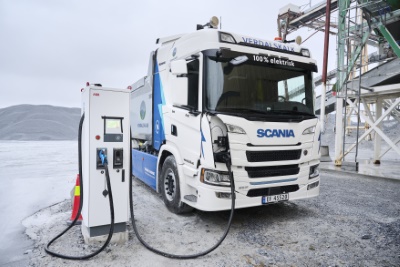Report urges action by truck makers on battery supplies
Just two of the major European truck brands have secured long-term supplies of battery raw materials, according to campaign group Transport & Environment (T&E), in a new report which gauges the preparedness of vehicle manufacturers for moving to fully zero-emission production.
T&E set about ranking the truck manufacturers’ readiness for the transition by assessing the compatibility of their voluntary statements on zero-emission sales targets with climate needs, and the extent to which their plans and activities align with those targets.
It includes comparisons with US and Chinese counterparts to assess which manufacturers are best positioned to win the global race for CV technology leadership.
In its report – titled Ready or Not: Who are the frontrunners in the global race to clean up trucks? – T&E highlights Mercedes-Benz, Scania and MAN as the “three European frontrunners based on their announced ambition and strategy”, with all aiming for 100 per cent zero-emissions truck sales by or before 2040.
The report identified Volvo Trucks as the current market leader in European battery-electric truck sales, and the manufacturer with the most ambitious 2030 target of 70 per cent zero-emission truck sales. But it said the brand “does not appear committed to fully go zero-emission in the long-term”, citing its support for gas trucks and biofuels.
One key focus of the report was battery supply chains, an area in which it urged truck manufacturers to “get more active”.
Globally, US electric vehicle specialist Tesla, Chinese multinational BYD, and Traton which includes the MAN and Scania brands, “are the only manufacturers to have secured long-term supplies of battery raw materials,” it said.
“In all three cases, they benefited from their own or their group’s efforts to secure this supply for the car market segment. Other manufacturers are either less integrated with carmakers or not connected at all. As a result, they must build their battery value chains from the ground up (alone or through partnerships), and risk being late to secure raw materials.”
It went on to note that nine of the top ten battery cell manufacturers in 2030 are expected to be Chinese, meaning Chinese OEMs are less likely to have trouble sourcing batteries – while recent US legislation is expected to boost battery manufacturing investment at the expense of European projects, with two-thirds of planned battery capacity in Europe said to be at risk.
By 2030, the report said, the US was projected to almost triple its share of global battery cell production to 14 per cent, while China would remain the world leader accounting for 69 per cent.
“As a result, the leadership of legacy European truckmakers risks being challenged in coming years, unless they develop strong battery ecosystems, including not only cell manufacturing, innovation, and recycling, but securing raw materials as well,” warned the report.
Perhaps worryingly for the British market, DAF, the UK market leader and the only remaining ‘home’ manufacturer, was rated as the weakest of the European ‘big seven’ by T&E in terms of readiness to transition to fully zero-emission sales.
It said the Paccar subsidiary had not published a zero-emissions target for 2030 and scored lowest of the legacy manufacturers on battery value chain.
A DAF spokesperson told Transport Operator, however, that the conclusions of the report were “somewhat at odds with what we are witness to here in the UK: not only in relation to DAF, but also considering the relative progress being made by other OEMs”. He queried whether the judging criteria used in the report were “the most appropriate”.
T&E ranks Scania as the most prepared for zero-emissions at 86.8 per cent, with Mercedes (84.5) and MAN (75.1) behind it. Volvo Trucks’ EU operations are rated 62.4 per cent ready, followed by its Volvo Group stablemate Renault Trucks at 53.3. Iveco is rated at 44.1 per cent ready, and DAF at 24.4 per cent.
On the global scale, Tesla is ranked at 78.9 per cent zero-emission readiness, with the US operations of battery manufacturer BYD following at 72.9 per cent.
The scores given comprise up to 40 points reflecting manufacturers’ ambition on zero-emissions in terms of voluntary targets, and up to 60 points reflecting industrial strategy, including vehicle model line-up, component value chains, and approaches to energy and financing. Penalties were incurred for the support of non-zero-emission technologies.
T&E partly attributes the strong showing by the leading European makes to stringent carbon reduction targets both voluntary and legislative, imposed by the EU. But it suggests lawmakers should set tougher targets of a 65 per cent reduction in CO2 by 2030, and a 100 per cent reduction by 2035, which it says would encourage the leaders to keep up the pace, and the laggards to catch up.
It also notes that on a global scale, European manufacturers only have four representatives in the top ten, and says that the US and China have ‘champions’ in Tesla and BYD, with the latter already selling trucks in all three regions.
“These new entrants on the truck market could pose a threat to established truckmakers in coming years,” said T&E, noting their development of strong battery supply chains, including securing raw materials, and their experience in rapidly scaling up zero-emission manufacture in the passenger car segment.











